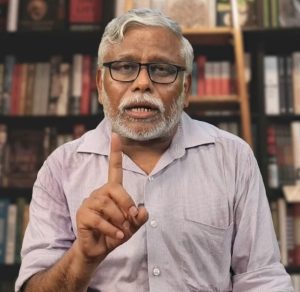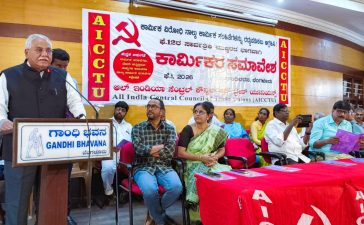Waqf Amendment Act 2025 Sparks Outcry Over Muslim Representation
Critics allege the new law undermines Muslim control over Waqf institutions, calling it a continuation of majoritarian encroachment on minority religious affairs.
New Delhi – The passage of the Waqf (Amendment) Act, 2025 has ignited a storm of protest across India’s Muslim community and civil society organizations. Approved hastily by both houses of Parliament and signed into law by the President, the legislation is being condemned as a direct attack on the constitutional rights of Muslims and a fundamental reshaping of Waqf governance in India.
Opposition leaders, minority rights advocates, and legal experts claim the amendments strip Muslims of majority control over Waqf institutions, despite these being community-endowed religious assets managed traditionally by Muslims.
A Blow to Muslim Autonomy?
According to Article 26 of the Indian Constitution, every religious group has the right to establish and manage its own religious affairs and institutions. Historically, the administration of Waqf properties—charitable endowments in Islamic tradition—has been governed by Muslims themselves. This principle was legally upheld in the Waqf Act of 1995, which required that nearly all members of the Central Waqf Council (CWC) be Muslims.

However, the 2025 amendments significantly alter this composition. While the total number of council members increases to 22, only 10 members are now mandated to be Muslims, effectively reducing them to a minority within their own religious institution. The government has made it obligatory for at least two non-Muslim members to be appointed, and it has removed the requirement for the Council’s Chief Executive Officer (CEO) to be Muslim—another break from the 1995 structure.
Critics Say “Secularism for Muslims Only”
Commentators argue that this restructuring is discriminatory and hypocritical. “If the government believes that religious councils should be secular in composition, why are similar mandates not applied to Hindu, Sikh, Jain, or Christian religious trusts?” asked a legal scholar speaking to this outlet. “This is selective secularism—meant only for Muslims.”
Further compounding the controversy is a new clause requiring anyone wishing to make a Waqf donation to prove they have been Muslim for at least five years, a stipulation that critics say is arbitrary, discriminatory, and violates Article 300A of the Constitution, which protects the right to property.
State Waqf Boards Also Affected
The amendments have also overhauled the structure of State Waqf Boards, reducing Muslim representation here as well. Under the 1995 Act, seven of the board members were required to be Muslims. The new law requires only four Muslims out of eleven members, while mandating two non-Muslim members, with the remaining five open to government appointment.
“This is not about administrative reform. It is about control,” said one activist. “When you reduce Muslims to a minority in managing their own religious institutions, you’re not reforming the system—you’re replacing it.”
Legal Challenge and Historical Parallels
Multiple petitions have already been filed with the Supreme Court challenging the constitutional validity of the amendments. The court has agreed to hear the matter, though similar high-profile cases like the CAA/NRC remain pending without interim relief.
Legal experts point to Babri Masjid, CAA, and the now-repealed farm laws as examples of how aggressive legislative changes can deeply impact marginalized groups. They warn that the Waqf Amendment Act is the latest in a pattern of legislation pushed through Parliament with limited debate and little regard for community consultation.
Communal Bias in Implementation?
Several analysts have noted a double standard in how the current government has treated religious institutions. In recent years, laws governing the Kashi Vishwanath Temple, Ayodhya’s Ram Temple, and even the Tirupati Devasthanam Trust have ensured that only Hindus occupy administrative roles. Meanwhile, the Waqf law now opens doors for non-Muslims to manage Islamic endowments.
“The BJP government is not secularizing religious administration—it’s selectively targeting Muslims for disenfranchisement,” argued one columnist in a national daily. “This isn’t reform; it’s an ideological project.”
Path Ahead: A Call for Mass Mobilization
Given the limited legal remedies and the political majority supporting the law, critics are calling for a broad-based, interfaith movement—similar to the anti-CAA and farmers’ protests—to demand its repeal.
“For this movement to succeed, awareness is key,” wrote a community leader. “People must understand what Waqf is, why it matters, and how this law threatens its very existence.”
Official Texts and Further Reading
-
Full text of the Waqf (Amendment) Act, 2025: Ministry of Minority Affairs
-
Original Waqf Act of 1995: Central Waqf Council
Conclusion
The Waqf (Amendment) Act, 2025 marks a fundamental shift in the management of Muslim charitable assets in India. While framed by the government as a step toward “inclusive governance,” critics argue it is yet another step in the systematic disempowerment of India’s Muslim community. With legal battles looming and public mobilization gaining steam, the future of this legislation—and of Waqf autonomy—remains uncertain.
🟠 Short Summary
The Waqf (Amendment) Act, 2025 introduces sweeping changes to how Waqf properties—Muslim charitable religious endowments—are governed in India. It reduces Muslim representation on Waqf Boards, introduces non-Muslim appointments, and mandates a five-year religious identity proof for donors. Critics argue that the law is unconstitutional, communal, and aimed at undermining Muslim autonomy over religious assets.
🟣 Context & Background
-
Waqf refers to a charitable endowment in Islamic law, usually for religious or social welfare purposes (mosques, madrasas, graveyards, schools, etc.).
-
The Waqf Act of 1995 granted Muslims control over Waqf assets through dedicated State and Central Waqf Boards.
-
The 2025 Amendment reduces Muslim majority in these bodies and removes the requirement for a Muslim CEO, while mandating non-Muslim representation.
-
Legal experts see this as a violation of Articles 26, 29, and 300A of the Constitution.
🔴 Statements
-
All India Muslim Personal Law Board:
“This is a brazen attack on our constitutional rights and religious freedom. The community will not accept this silent disenfranchisement.” -
Central Waqf Council (resigned member):
“Waqf is a Muslim religious institution. Including non-Muslims in its administration is like appointing a Maulana to run the Tirupati Trust.” -
Senior Advocate, Supreme Court:
“This Act will not survive constitutional scrutiny. It’s both arbitrary and discriminatory.” -
Social Activist:
“If this is secularism, why are Hindu religious trusts untouched? Why are only Muslims expected to prove inclusivity by dilution?”
🟡 Quotes for Use in Reports
“This is not about inclusion; it’s about control.”
— Civil Rights Advocate
“The state cannot claim neutrality by interfering only in Muslim institutions.”
— Constitutional Law Expert
“They started with our homes, moved to our worship, and now they want our endowments.”
— Protestor at Jama Masjid rally
🟢 Q & A
Q: What is Waqf?
A: Waqf is a religious endowment made by Muslims, typically to fund mosques, educational institutions, or public services for the community.
Q: What does the 2025 Amendment change?
A: It reduces Muslim representation on Waqf Boards, mandates non-Muslim members, removes the requirement for a Muslim CEO, and imposes new rules for donations.
Q: Why is this controversial?
A: Critics say it violates religious freedom, disproportionately targets Muslims, and reflects a larger trend of state encroachment into minority affairs.
Q: What legal grounds are opponents citing?
A: Violations of Articles 26 (religious freedom), 29 (minority rights), and 300A (property rights) of the Indian Constitution.
🕰️ Timeline of Events
2022–2023: Central Interventions Begin
-
The BJP-led central government increases scrutiny of Waqf Boards across India.
-
Several state Waqf Boards are dissolved or taken over, citing corruption and mismanagement.
-
Leaked internal circulars suggest plans to “rationalize” or repurpose Waqf land for “public use.”
Mid-2023: Draft Bill Circulates
-
A draft bill emerges proposing amendments to the Waqf Act, 1995.
-
Key proposals include transferring powers of property management from Muslim-led Waqf Boards to state-appointed administrators.
October 2023: Massive Backlash
-
Muslim scholars, civil rights activists, and community leaders condemn the bill.
-
Imarat Shariah and All India Muslim Personal Law Board release joint statements.
-
Protests erupt in multiple cities, including Hyderabad, Patna, Bhopal, and Bengaluru.
January 2024: State Governments Begin Action
-
Karnataka, Madhya Pradesh, and Gujarat announce review committees to “audit” Waqf land.
-
Notices are issued for eviction from several Waqf properties claimed to be “encroachments.”
March 2024: Legal Pushback
-
Multiple petitions are filed in various High Courts.
-
Supreme Court advocate files PIL challenging the constitutionality of the proposed amendments.
April 2025: Supreme Court Admits Petition
-
The Supreme Court issues notice to the Union Government and schedules hearings for July 2025.
⚖️ Legal & Administrative Aspects
Key Provisions in the Draft Law:
-
Dissolution of Waqf Boards: Proposes handing control to government-appointed trustees.
-
Reclassification of Waqf Land: Allows the government to declare Waqf land “public utility land.”
-
No Community Consultation Required: Removes requirement of Muslim community involvement in key decisions.
Concerns Raised:
-
Violation of Article 26 (Freedom to manage religious affairs)
-
Infringement of Minority Rights under Article 29 & 30
-
Legal experts argue the proposed law undermines the essence of Waqf as a permanent endowment.
Current Status of Waqf Properties:
-
India has over 6 lakh acres of Waqf land.
-
Many properties include mosques, dargahs, graveyards, orphanages, and schools.
⚔️ Legal Battle Ahead in Supreme Court
Key Petitioner:
-
Advocate Faizan Rahmani (on behalf of several Muslim organizations).
Main Arguments:
-
The amendments amount to unconstitutional expropriation of religious minority property.
-
Government is violating the autonomy guaranteed to Waqf by The Waqf Act, 1995 and Constitutional protections.
Expected Timeline:
-
May 2025: Government to file affidavit defending the new law.
-
July 2025: Constitution Bench may hear the matter.
-
2026 (tentative): Final ruling expected before state elections in Bihar and Uttar Pradesh.
Potential Outcomes:
-
Supreme Court could strike down the law if found unconstitutional.
-
May trigger a broader debate on minority rights and secularism in India.
#WaqfAmendment2025 #HandsOffWaqf #ReligiousFreedom #StopWaqfHijack #MuslimRights #MinorityTargeted #SelectiveSecularism #WaqfUnderAttack #ConstitutionalCrisis #WaqfProtest
![]()











